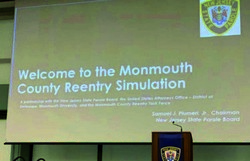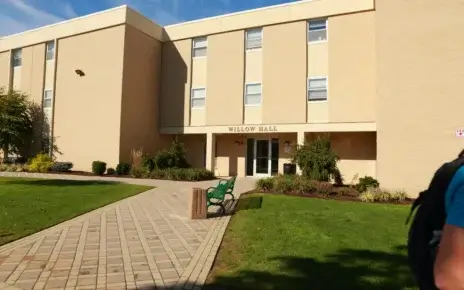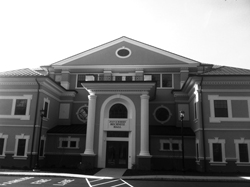The University hosted a reentry simulation to educate students, faculty and professionals in the community on the experiences of individuals trying to reintegrate into society after prison on Tuesday, Oct. 22.
The reentry simulation is an activity where participants assumed the role of parolees and performed tasks in 15-minute sessions with each session representing a week. By the end of the activity, participants will have simulated a month in the life of a person recently released from prison.
Speakers included Samuel Plumeri, Chairman of New Jersey State Parole Board; Kimberlynn Reeves, spokeswoman for the United States Attorney Office in the District Delaware; Richard Viet, Associate Dean of Humanities and Social Sciences; Nicolle Parsons-Pollard, Vice Provost for Academic and Faculty Affairs; and Nicholas Sewitch, J.D., Chair of the Criminal Justice Department and Specialist Professor.
The event began with opening remarks from Sewitch. He referenced Harper Lee’s To Kill a Mockingbird which revolves around a black man who was wrongfully accused of raping a white woman and quoted a specific passage. “You never really understand a person until you consider things from his point of view…until you climb in his skin and walk around in it.” He found parallels in this historic book to the experiences of incarcerated individuals.
Parsons-Pollard added, “[Reentry] is not about pulling yourself up by your bootstraps when it comes to being released from prison, instead it is much more than that.” During one exercise, Parsons-Pollard had participants remove their shoes as a metaphor for immersion in someone else’s life, in this instance a former convict. Reeves, expanded on the metaphor and said, “You need to have boots and straps before you can pull them up,” referring to the prison population reentering society.
Plumeri echoed Reeves’ sentiment. “The system has limited money, resources and support for those who are seeking to assimilate back into society, so society requires an open mind and implement strong community-based programs that would aid in success,” he said.
Viet explained, “A failure to succeed in life for ex-offenders not only affects themselves but their families and communities.”
Following opening remarks, participants were handed a folder with a nametag, type of crime they committed, some resources and a four-week breakdown of things they needed to attend to satisfy their terms of parole.
During the simulation, a student played a character named Nate who served four years in prison because of internet fraud. One of the resources he had was a $100 voucher for a computer that to sell to at a pawn shop.
Upon arrival, the store told him that he could only get the laptop was from 2013 before his arrest. They did not sympathize when he explained he needed the money to eat.
At the end of week two in the simulation, Nate tried to attend his scheduled AA meeting but then time was called for that week, and he had to return to his seat but his bus ticket was taken by a women who said “too bad” despite not providing any help.
Eventually, Nate ran out of bus tickets and had to walk places, but his parole officer said that he wasn’t allowed to walk to those places and if he could not find some way to get food before week three Nate would be sent back to jail. Something that the parole officers overlooked were the lines that wrapped around the room just to receive ID or more bus tickets.
This entire simulation demonstrated the lack of accomadation prisoners received upon returning in society.
Bryanna Welch, a junior sociology student, explained her experience during the exercise. In the simulation, she was a man named Justin who did 20+ years in prison for murder, a drug offense and for possessing a gun.
“I had to do get an ID before I could complete anything on my parole list, and it was impossible to complete. It was frustrating, stressful because I didn’t know where to go, and I did not have enough time at all. Even though it is just a stimulation, those who leave prison experience the same obstacles I did,” Welch said.
Those taking part in the experience learned what it is like to return home from prison with few avaliable resources and many obligations.
These obligations included obtaining identification, applying for social services, finding a job and residence, reporting to probation, and paying restitution. Failure to accomplish these tasks resuts in returning to prison.
Sewitch stated, “It’s very important for students to go through this because they are the practitioners of tomorrow.”
Sewitch added that, as for the professionals that attended, it was critical for them to see what kind of issues these people run into due to their policies.
It is important that stakeholders in the system understand the obstacles that are placed in front of those reentering citizens that is of no fault of the reentering citizen. Rather, reasonable accomadations are needed.
“Successful reentry is part of everybody’s best interest. I don’t care if you are a conservative or a liberal. I don’t care if you are democrat or republican. That offender that reenter society become happy, healthy citizens, should suit everyones ideology and philosophy,” Sewitch said.
The event was sponsered by the New Jersey State Parole Board with the support of Monmouth County Reentry Taskforce, Monmouth’s Criminal Justice Department, and the United States Attorney’s Office, District of Delaware.
PHOTO TAKEN by Brittany Macaluso




